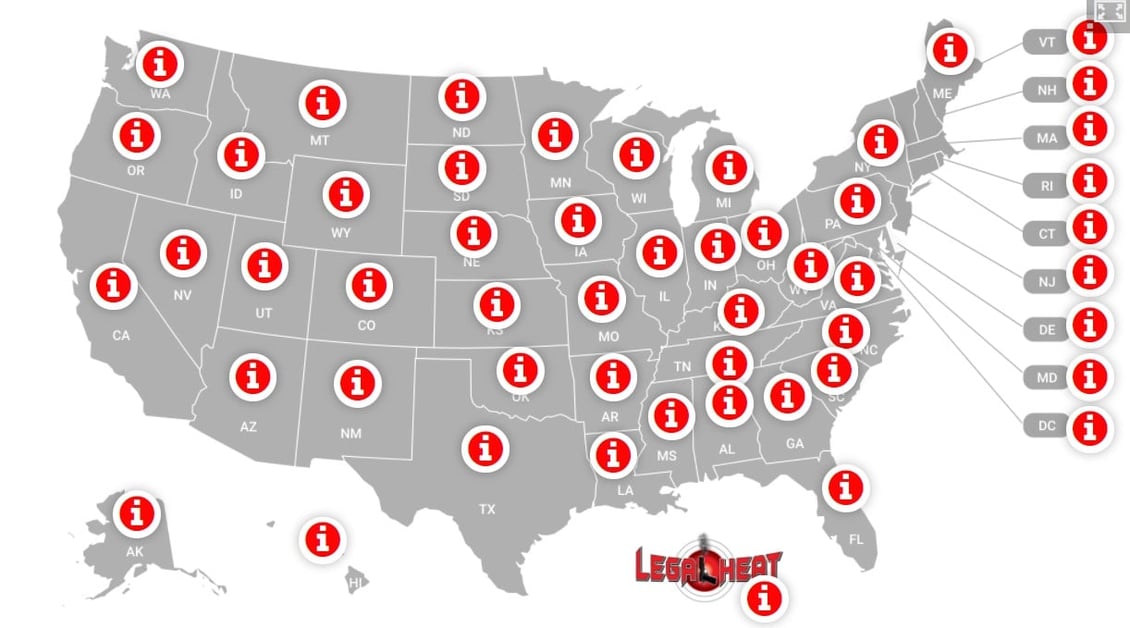Our friends at Legal Heat give us a state-by-state look at each state’s gun laws to find out if you have a duty to inform an officer that you’re carrying a firearm. The interactive map further down in this article and it’s information was compiled by Phil Nelsen, who is an attorney and expert in firearm law. It’s important to know the Duty To Inform States, so let’s get into it.
First, let’s go over some of the basics.
Table of Contents
What is Duty To Inform?
Duty To Inform States are states that have regulations mandating concealed carriers to disclose the presence of a firearm to law enforcement officers during specific encounters. These laws vary by state and are critical for ensuring lawful and safe interactions between concealed carriers and law enforcement personnel.
Variations in Duty To Inform Laws
Duty To Inform laws can differ significantly from state to state. Some states require immediate disclosure as soon as an officer approaches, while others may only necessitate informing if asked directly by the officer. It is crucial for concealed carriers to understand the specific requirements in their state to remain compliant.
Why Duty To Inform is Important

The primary purpose of Duty To Inform laws is to enhance safety during interactions between armed civilians and law enforcement officers. When officers are aware of a firearm’s presence, it helps them manage the situation more effectively and reduces the risk of misunderstandings or potential confrontations.
Duty To Inform States: Interactive Map
This only applies to a person with the state’s designated version of a license or permit to carry a concealed firearm (or weapon, as the term applies) or granted reciprocity therein to do so.
- We are not covering open carry.
- We are not covering what happens if you are in violation of a crime.
- We are covering if you are legally obliged to inform law enforcement as to your legal concealment of a firearm without first being asked.
- If you are in a state where firearms registration is required as a condition to receive a permit, or are required to have a permit to acquire, or any of the other convoluted mechanisms prior to being a legal, concealed carrier in that state – this list assumes you have lawfully completed those conditions. So if you have not completed those processes, this list isn’t for you.
- This article is written (and researched) from the perspective that if you are:
- Legally allowed to conceal a firearm AND
- You are stopped by law enforcement THEN
- Are you required to inform them you have a concealed firearm on your person?
- Duty To Inform is taken to mean, in the context of this article, a specific lawful duty to inform a member of law enforcement without being asked first.
Take a look at the interactive Duty To Inform Map below and click on your state to see what the law states. You may be surprised at what you find!
Compliance and Penalties
Non-compliance with Duty To Inform states and their laws can result in severe penalties, including fines, suspension of concealed carry permits, or even criminal charges. Understanding and adhering to these laws is essential for any responsible gun owner. Ignorance of the law is not a valid defense, so staying informed is crucial.
How to Stay Informed

Concealed carriers should regularly review their state’s firearm laws and Duty To Inform states requirements. Joining organizations such as the USCCA (United States Concealed Carry Association) or GOA (Gun Owners of America) can provide valuable resources and updates on legal changes.
Best Practices for Concealed Carriers
- Know Your State Laws: Always be aware of the Duty To Inform states and any states you travel to with your firearm.
- Carry Proper Documentation: Ensure you have your concealed carry permit and identification with you at all times.
- Practice Safe Disclosure: If required to inform an officer, do so calmly and clearly. Keep your hands visible and avoid making sudden movements.
Conclusion
Duty To Inform laws play a vital role in maintaining safety and legal compliance for concealed carriers. By understanding and adhering to these laws, concealed carriers can ensure they responsibly exercise their rights while minimizing risks during law enforcement encounters.
Safety Tip: Always be aware of Duty To Inform states requirements and disclose the presence of a firearm to law enforcement calmly and respectfully.
Legal Disclaimer
The information provided on this website and in this article is for general informational purposes only and does not constitute legal advice. We are not attorneys, and the information presented should not be relied upon as legal advice. Always consult with a qualified legal professional regarding any specific legal matters or concerns you may have. The content is intended to provide a broad understanding of the law and is not a substitute for legal advice from a licensed attorney in your jurisdiction. We make no guarantees about the completeness, reliability, or accuracy of the information provided. Any action you take based on the information on this website is strictly at your own risk.














